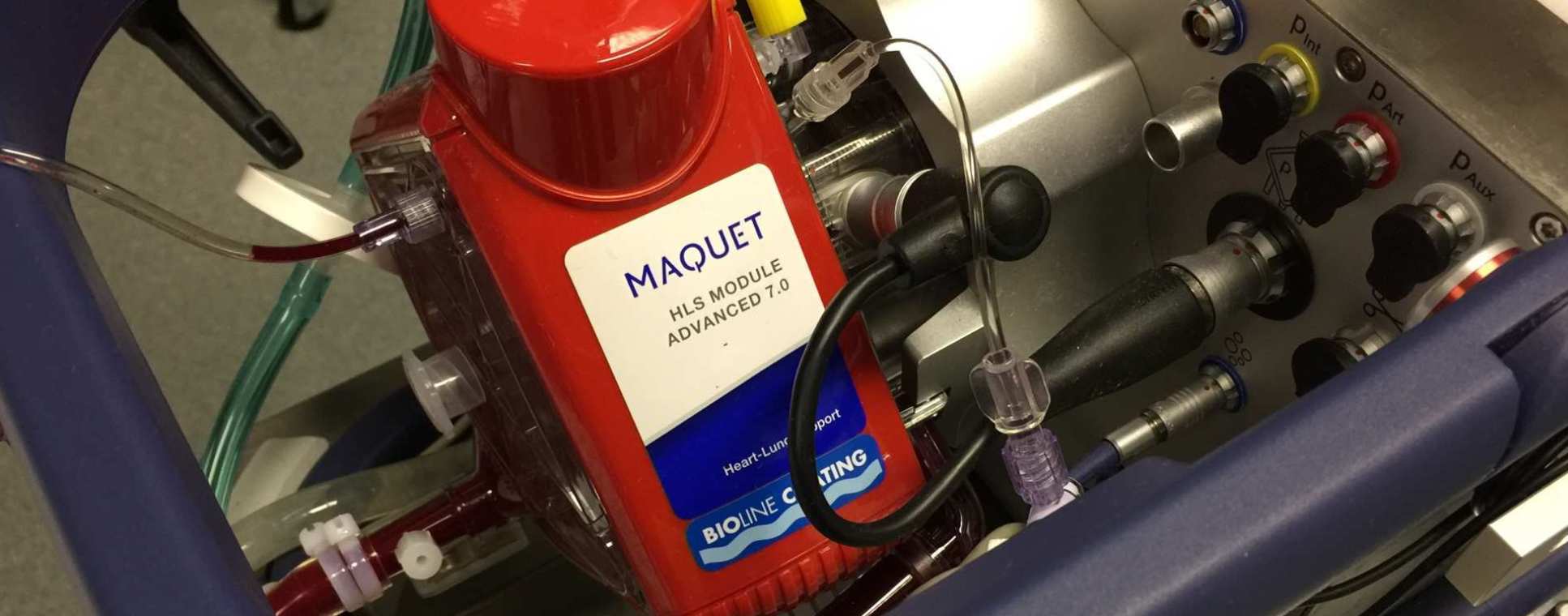
Contact us
For any enquiries related to Extracorporeal life support, please contact
Dr Brijesh Patel
brijesh.patel@imperial.ac.uk
+44 (0)20 3315 8897
Overview
Extracorporeal membrane oxygenation (ECMO) is a form of life support derived from cardiac bypass technology. It uses large cannulae to access venous blood, actively pumping it through a membrane lung at 3-6L/minute where oxygen is added and carbon dioxide is removed. ECMO can be used to support severe respiratory failure using a veno-venous (VV) cannula configuration and to support severe cardiac failure using a veno-arterial (VA) cannula configuration. Adult patients for VA ECMO may be cannulated centrally, directly into the great vessels via a sternotomy during cardiac surgery or cannulated peripherally, most commonly via the femoral vessels, although there are other approaches, including the subclavian artery.
The last decade has seen a resurgence of interest in the provision of extracorporeal membrane oxygenation as a supportive therapy for cardio-respiratory failure. The Royal Brompton and Harefield NHS Foundation Trust is an internationally leading centre for the provision of extracorporeal life support as a bridge to organ recovery or as a bridge to longer term support or transplantation.
Summary of current research
Clinical Research
- Evaluation of ex vivo lung perfusion and organ care systems in the optimisation of donor organs.
- Determination of whether endogenous thrombin potential (ETP) assessed by thrombin generation and parameters derived from thromboelastogram can be used to predict development of intracranial haemorrhage and thrombotic events in patients receiving VV-ECMO treatment for severe respiratory failure.
- Bronchoscopic sampling of VV-ECMO patients for complete and sequential microbiological, biomarker and DNA sequencing. The relationship of the endobronchial environment to structural, and functional progress factors.
- The complete structural, functional and integrated cardiorepirarory long-term evaluation of VV ECMO survivors of SARF.
- Utility of right heart ECHO in patients with severe respiratory failure.
Clinical trials
- S-CAP Study – A molecular toolkit for the microbial investigation of severe community acquired pneumonia (S-CAP Study) from intensive care and ECMO units. NIHR funded.
- Study of Argatroban versus Unfractionated Heparin for Anticoagulation to support Extracorporeal Membrane Oxygenation In Adult Patients with Severe Respiratory Failure
- The REST Study - pRotective vEntilation with veno-venouS lung assisT in respiratory failure. A pragmatic randomised controlled trial to determine whether Veno-Venous Extracorporeal Carbon Dioxide Removal (VV-ECCO2R) in mechanically ventilated patients with hypoxaemic respiratory failure improves 90-day mortality.
Database research
- Evaluation of mechanical ventilation practices in SARF network referrers. In collaboration with the ICS.
- Evaluation of Severe Adult Respiratory Distress Syndrome Patients Undergone Veno-Venous Extracorporeal Membrane Oxygenation. To investigate the role of different aetiologies on duration of hospitalisation, the role of co-morbidities on outcome, and to validate VV-ECMO scoring systems with outcome.
- To determine optimal time between diagnosis of severe respiratory failure to cannulation of VV-ECMO, investigate organ failures and their interactions.
- Evaluation of the incidence of Heparin-induced Thrombocytopenia in ECMO – Study in collaboration with UK SARF network.
Service innovation research
- Evaluation of the impact of a welfare intervention to VV-ECMO patients and family outcome.
Key members within Extracorporeal life support
Dr Nandor Marczin
/prod01/channel_3/media/migration/faculty-of-medicine/Nandor_Marczin--tojpeg_1470837327275_x4.jpg)
Dr Nandor Marczin
Senior Clinical Lecturer Honorary consultant
Dr Brijesh Patel
/prod01/channel_3/media/migration/faculty-of-medicine/202592_Patel_Brijesh--tojpeg_1478122061923_x1--tojpeg_1485344058751_x4.jpg)
Dr Brijesh Patel
Clinical Lecturer
Funders and collaborators
- Mr Andre Simon (Royal Brompton and Harefield Foundation Trust)
- Mr Richard Trimlett (Royal Brompton and Harefield Foundation Trust)
- Professor John Pepper (Royal Brompton and Harefield Foundation Trust)
- Dr Susanna Price (Royal Brompton and Harefield Foundation Trust)
- Dr Anna Reed (Royal Brompton and Harefield Foundation Trust)
- Dr Deepa Arachchillage (Royal Brompton and Harefield Foundation Trust)
- Dr Greg Quinlan (NHLI, Imperial College London)
- Dr Nick Barratt (Guy’s and St Thomas’ NHS Foundation Trust)
- Dr Andrew Retter (Guy’s and St Thomas’ NHS Foundation Trust)
- Professor Danny Mcauley (Queen's University of Belfast)
The Royal Brompton and Harefield NHS Foundation Trust is one of five ECMO centres in the UK commissioned for severe respiratory failure. The collaborative group participates in network referrers days and patient days throughout the year.